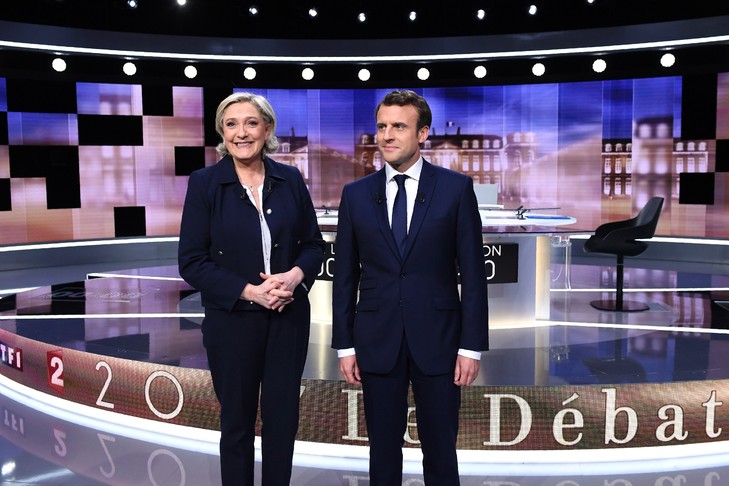Paris – French law prohibits carrying out surveys and opinion polls based on race or religion, so it is therefore difficult to reach conclusive results on who Arabs or Muslims will vote for in Sunday’s presidential elections. There are some five or six million citizens of Arab or Muslim origin, which means they hold sway over the elections. However this power has been weakened because of the low number of those registered on electoral lists despite awareness campaigns that were waged to encourage them to vote.
For decades, the “Arab voice” usually voted in favor of the Communist and socialist left in France. After the defeat of former President Nicolas Sarkozy in 2012, his supporters attributed part of the loss to the “Arab voice” voting heavily in favor of his rival Francois Hollande. In 2002, socialist candidate former Prime Minister Lionel Jospin lost by a narrow margin in the first round of the presidential vote to then National Front leader Jean-Marie Le Pen after the “Arab voice” snubbed him for making pro-Israel statements. As for the current elections, the “Arab voice” had pinned their hopes on far-left candidate Jean-Luc Melenchon, but he, and Socialist Party candidate Benoit Hamon, did not make it to runoff. The elections are now down to economic and social liberal Emmanuel Macron and far-right Marine Le Pen, who is known for her anti- immigrant, Arab and Muslim stances.
The Arab and Muslim voters themselves are now at a loss.
Asharq Al-Awsat sought to obtain the views of a number of “Arab voice” voters from different generations, religions and ages in order to demonstrate the disparity in their choices and the reasons pushing them to vote for Macron or Le Pen:
Jean Masiha, a French national or Egyptian origin, is currently overseeing Le Pen’s economic program. He said that “Arabs in France believe more and more in the National Front’s ideas and her programs.” This has been demonstrated in the rise in the number of recruits from 2 to 6 percent in recent years.
In his assessment of the course of the “Arab voice”, Masiha said: “Our platform is built on the idea of returning the voice of the sense of citizenship and to those who we consider to be citizens regardless of their race or religion.”
Arabs are attracted to Le Pen because her program prioritizes France, its language, national anthem, culture and borders. This program stands in contrast to Macron’s, who denies the idea of citizenship and the existence of the French culture, said Masiha.
He believes that Macron discriminates between French Arabs, seeing them as Algerian or Lebanese or Moroccan.
“We on the other hand see their voices as French ones,” he added.
Masiha’s views reflect a small minority of the “Arab voice”. Given the choice between Le Pen and Macron, the vast majority leans towards the latter even though many are voting for him simply to thwart the far-right candidate’s advance.
Sophie Taheri, a French-Moroccan economic expert and activist in Macron’s “En March!” movement said that she is supporting him for his program, style and personality.
She stressed that she defends his progressive thoughts because she “believes in freedom, a society that is open to the world and committed to Europe and the development of the individual through the quality of work.”
Macron’s thoughts overcome the traditional lines of traditional right and left political currents that have held political life in France hostage for 30 years, she explained.
She also noted that Macron is keen on developing the economy in a way that confronts the challenges of the digital age, adding that she defends him because he is “generous, dynamic and has a sense of initiative.”
Naufal Ibrahimi al-Maili, a French Algerian researcher and university professor in Paris said that he will vote for Macron “without an overwhelming sense of happiness because my Algerian roots prevent me from voting for the daughter” of a leader who played a part in the Algerian-French conflict.
He also condemned Le Pen’s views on Islam, saying that they “pose a real threat to social peace in France.”
Hanine Barazi, a French-Syrian professor at the Sorbonne University, echoed Maili’s stances despite having reservations on Macron’s program. She did note however that he is a fresh face in French politics and is backed by the youth. She also praised his courage in recognizing that colonial France had committed errors, some of which could be tantamount to war crime.
Faraj Maatouk, a French-Tunisian historian and university professor, said that he supports Macron “without hesitation, even though I do not agree with his liberal program.”
He stressed that it is necessary to “stand against the rhetoric of hate” and efforts to “tear France apart and from Europe.”
“We should unite on the values of the French republic of liberty, equality and fraternity,” he stated.
Some voters will abstain from voting for Macron despite their hatred to Le Pen. Elie al-Kadi, a French-Lebanese owner of a Parisian restaurant, said that he chose Francois Fillon in the first round of the presidential elections.
After his defeat however, “I will not vote for Macron, the ally of globalization, or Marine Le Pen, who is employing hatred to win as many votes as possible,” he explained.
This was a similar stance shared by Sahar Ibrahim, a French-Egyptian housekeeper, who initially backed Melenchon. She said that she will not vote for Le Pen, “whose principles contradict with mine” or Macron, who is Hollande’s “heir”.
It is clear that the overwhelming majority of the “Arab voice” will go to Macron, but some will favor Le Pen.
Nassim K., a French-Lebanese told Asharq Al-Awsat by telephone that he will vote for the far-right candidate because “France needs a strong president who can restore security, strike terrorism with an iron fist, reintroduce secularism and allow people to live in safety, especially in the major cities and suburbs.”
“Le Pen embodies these values, not Macron,” he stressed.
